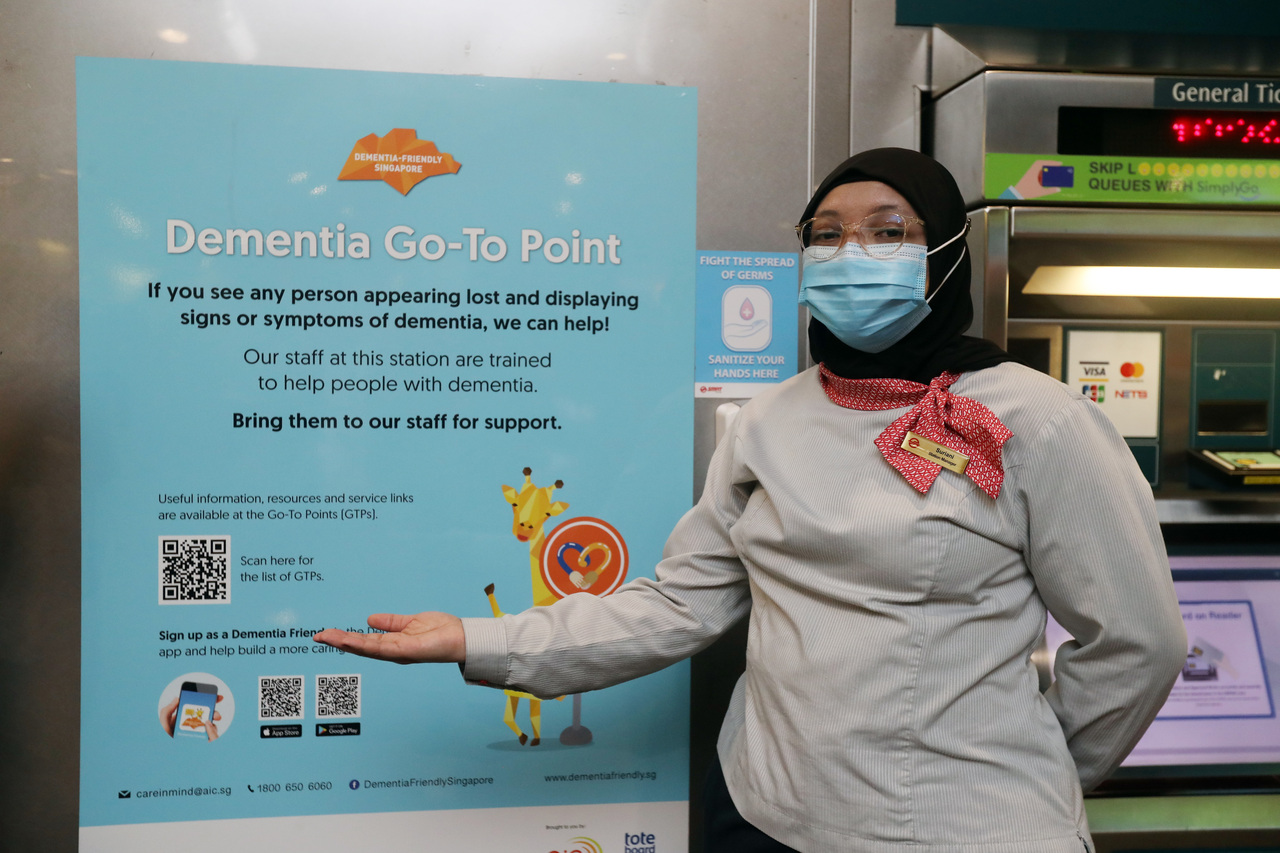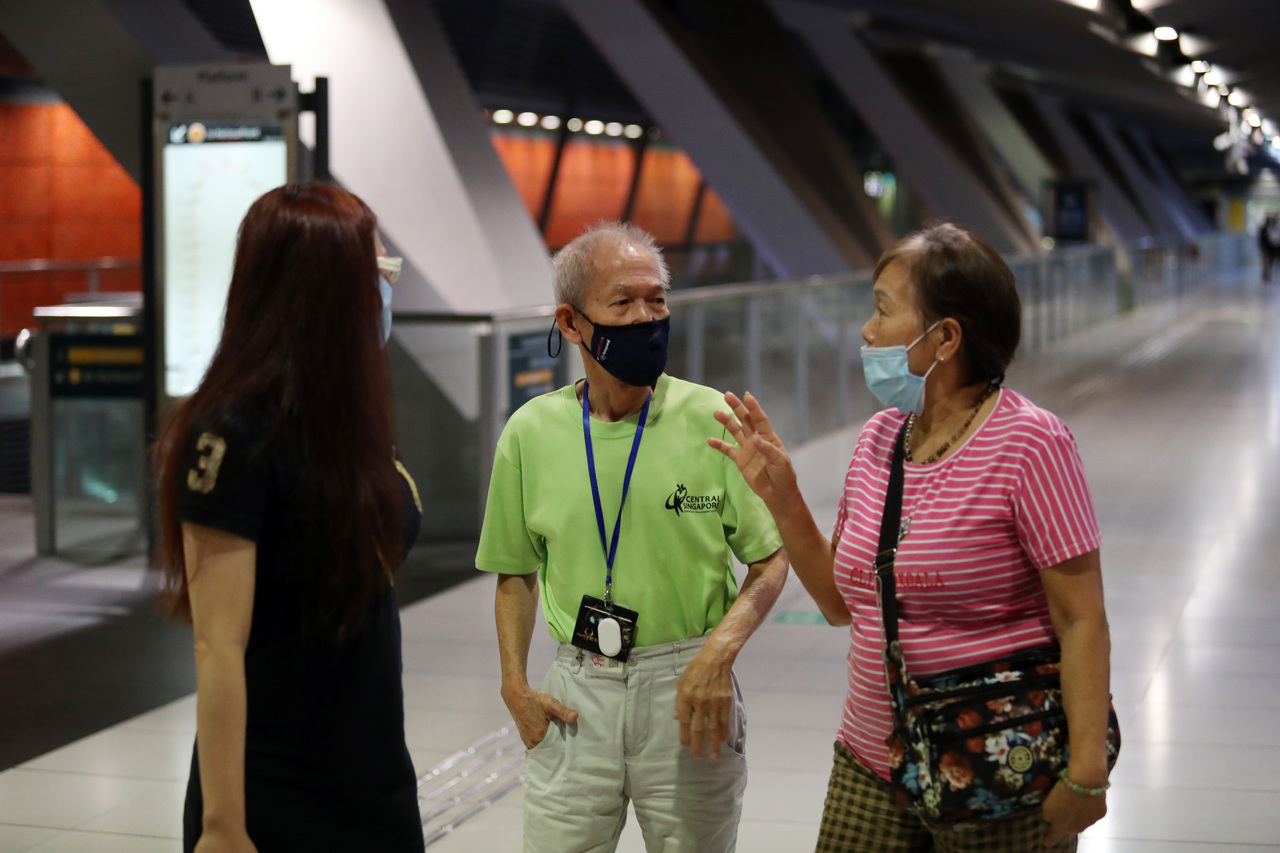Help for those with dementia who appear lost at all SMRT train stations by year-end
Sign up now: Get ST's newsletters delivered to your inbox

SMRT station manager Suriani Lestution Jaafar.
PHOTO: LIANHE ZAOBAO
SINGAPORE - All of the 98 train stations operated by SMRT will be listed as dementia go-to points (GTP) by the end of this year, allowing members of the public to take people with dementia who appear lost to these stations to get help.
Currently, 46 of SMRT's train stations and its four bus interchanges are listed as GTPs, the transport operator said in a media release on Sunday (Feb 27).
SMRT manages and operates train services on the North-South Line, East-West Line, the Circle Line, the new Thomson-East Coast Line and the Bukit Panjang Light Rail Transit.
"These GTPs serve as resource centres and 'safe return' points, where members of the public can bring persons living with dementia who appear lost or unable to remember their way home," SMRT said.
The staff at the station and the interchange are also trained to identify and assist people with dementia, and will help to reunite these people with their caregivers.
As part of a collaboration with SMRT, the Agency for Integrated Care (AIC) trained the staff to identify people with dementia.
Looking disoriented, being unaware of their surroundings, and not being able to recall their personal details or what happened a few hours ago are some of the tell-tale signs of dementia.
One of the staff who was able to put her skills to good use is Ms Suriani Lestution Jaafar.
She helped Mr Wong Mun Leong, 77, who has dementia, reunite with his family after he had been separated from them for about six hours.
Ms Suriani, who was a station manager at Tai Seng MRT station, was approached by a group of students in April last year during the evening peak hour.
They told her that an elderly man had tailgated them through the gantry.
She said: "I went out and asked him where he wanted to go, but he wasn't answering. He just smiled at me... He was also carrying an empty box and I had no idea what it was for."
After some time, Mr Wong started telling her about his childhood memories and said that he wanted to go to Lorong Tai Seng, once a kampung where he had lived when he was younger.
Mr Wong also did not have any identification documents with him and could not recall any contact number for Ms Suriani to call.
She then informed the Public Transport Security Command (TransCom), whose staff took a photo of him and found out that his family had filed a missing persons report hours ago.
When his family rushed down to the station at around 11pm, they saw that Mr Wong was wrapped in a blanket and had been given a hot drink.
His daughter, Ms Sharon Wong, said: "At that moment when we saw him, everyone was relieved... Finally we found him safe and sound."

<p>CMG20220226-YowCL01 饶进礼/尹云芳/SMRT train stations will be certified as Dementia Go-To Points [Paya Lebar MRT Station, Circle Line, Passenger Service Center] [EMBARGOED until the media release is issued, tentatively on 27 February, 10AM]</p> <p>The next-of-kin (Daughter - Sharon Wong, 41yos, project executive in constrution) (R) of a Dementia Communter Mr Wong Mun Leong (77yos) whom SMRT staff aided and wife 许银美 (70yos).</p>
PHOTO: CMG
Ms Wong, who works as a project executive in the construction industry, said her maid had taken her father to a barber in Boon Keng to get his hair trimmed but did not notice that the man had wandered off.
It was not the first time Mr Wong had done so, but he had been found quickly the previous times.
Ms Wong, 41, said she is grateful that her father had been well taken care of and added that GTPs would help caregivers like herself have peace of mind.
To date, more than 3,000 SMRT workers have been trained to help people with dementia.
SMRT and AIC said they also plan to roll out dementia-friendly seats in 29 more train stations by June this year, up from the current 16 stations.
Known as Kindness Seats, they will have brightly coloured decals to make them visible to seniors and those with dementia. Commuters will also be encouraged to help those in need.


